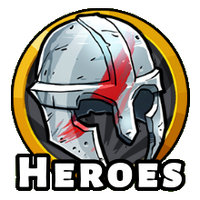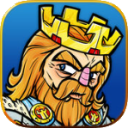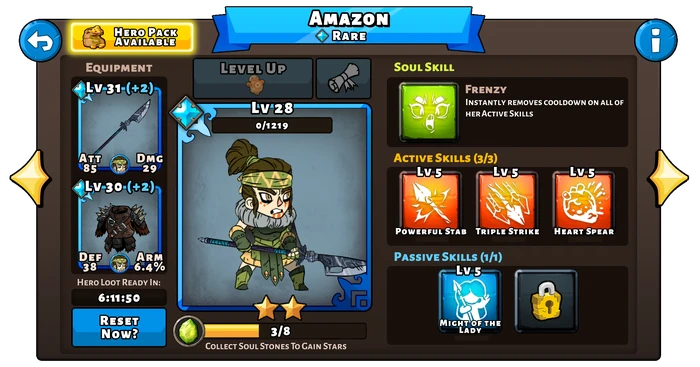No edit summary Tag: Visual edit |
Tag: Visual edit |
||
| Line 42: | Line 42: | ||
| − | The drop rate of soul stones depends on the rarity of a hero. |
+ | The drop rate of soul stones depends on the rarity of a hero. Player FreeFront on Kongregate made about one thousand find loot attempts, with seemingly the probability shown in the table. |
== Statistics == |
== Statistics == |
||
Revision as of 01:25, 9 January 2018
About

Heroes are an essential part of the game, where you can assemble a squad to go on an adventure in the Campaign or battle other keepers in real-time PvP. There are currently 31 heroes to choose from with varying roles and abilities.
Hero Options
In the Heroes section of your keep you can manage your heroes with things such as updating their equipment or selection of skills, and increasing their level and rank to make them more powerful.
Here are several things on heroes:
Amazon is also a rare, as evidenced by the blue border. (see next section).
- Hero level - Every hero has a level which is increased with Training Points. Increasing their hero level also increases their stats to make them more powerful including their attack, defense and active skills. The level cap is equal to your keeper level.
- Star rating - The star rating of a hero is their most important attribute. It's increased by collecting soul stones. Once enough are collected, a player may promote the hero to the next star rating at the cost of gold, or delay promotion (subsequent soulstones will be added toward the next star). Promoting a hero improves attack, defense, and health as well as the soul skill. At 2 stars, a 3rd active skill is unlocked. At 4 stars, a 2nd passive skill is unlocked. The maximum skill level is determined by star rating, initially capped at 4 but reaches 10 at 7 stars.
- Soul skill - The soul skill is a unique skill which varies between heroes. During combat the party's soul skill is charged up through different ways (e.g. Dealing damage), and once fully charged it can be initiated any time. Once initiated, the soul skill will immediately interrupt all combat, pushing your upcoming turns down by 1 in the process, and activate. All soul skills have a 10-15 second cooldown. Faster actions and affecting multiple targets will increase the rate soul energy is acquired.
- Active skills - These skills are your hero's main set of moves that are performed actively during combat. All heroes start with 1 active skill when first obtained; the rest can be unlocked once the corresponding Skill Scroll has been obtained. The level of the skill can be increased through further skill scrolls, or if no skill scrolls are available, at the expense of skill points. Most active skills improve primarily with the hero's level rather than skill level.
- Passive skills - Passive skills improve the hero or party permanently in combat, such as increasing self's health or increasing all resistances of the party. Like active skills, they can be improved by using skill points or skill scrolls. These typically do not increase with a hero's level unless they deal damage. Importantly, passive skills cannot be dispelled or canceled. Even when a hero is dead, any passive bonuses to their team will be retained.
- Equipment - Each hero uses a specific weapon and armor class. Weapons improve attack and damage value while armor improves defense and armor value. Some weapons and armor have a balanced attack and defense boost, and most have a bonus effect when equipped (e.g. Increase crit chance by 2%). The rarer the equipment is, the higher its damage or armor stats—and typically the attack and defense bonuses as well, although not always. Rarer equipment will however have greater potential at the end game, as their level caps are higher (55 for super rare, 65 for epic, and 75 for the final recipe for an equipment type).
- Hero loot - Every 8 hours you can play a campaign level which has loot for a specific hero. The level chosen is random, but only from campaigns levels which have already been beaten, and typically selective for higher level campaign missions. The loot can be a soul stone, a normal skill scroll, or an ancient skill scroll.
Find Loot
| Hero Rarity | Soulstone
Probability |
|---|---|
| common | 75% |
| uncommon | 50% |
| rare | 30% |
| super rare | 10% |
| epic | 5% |
To go further in-depth on the Hero Loot option, one can consider the drop rate of soul stones. Scrolls aren't that interesting once a player has a reasonable skill level, so soul stones are really the only reason to do Find Loot.
The drop rate of soul stones depends on the rarity of a hero. Player FreeFront on Kongregate made about one thousand find loot attempts, with seemingly the probability shown in the table.
Statistics
Note: All skills that increase or reduce a statistic can stack with each other. Each application however has its own duration and will dissipate individually when that duration ends. Percentage-based stats such as armor will be increased or decreased additively. Multiplicative skills affecting non-percentage-based stats, like defense (for example the Paladin's Holy Shield or Barbarian's Baleful Glare), will multiply by the current amount. This means successive Baleful Glare's will reduce by smaller and smaller amounts, while successive Holy Shields (only possible through cooldown reduction), will apply larger and larger amounts of defense.
- Attack – A hero's offensive potential. All damage dealt (including additional damage from bonus effects, weapon damage, or damage buffs) are increased by ~30% for having a higher attack than your target's defense, and continue to increase the larger the gap grows. However, attack cannot be buffed by more than a factor of 3. Maintaining an attack stat advantage is fundamental for any damage dealer. Skills, weapons, and armor that modify attack are very valuable, especially in PvP.
- Defense – A hero's defensive potential. A higher defense than an aggressor's attack is of utmost importance for being competitive in a fight. Similar to attack, defense cannot be buffed beyond a factor of 3. Even backline heroes require a high defense to survive against area damage. Skills, weapons, and armor that modify defense are very valuable, especially in PvP.
- Health – How much damage a hero can take before perishing. Health can be restored through heals, potions, or reinforced via bonus health. Bonus health is effectively a heal, functioning the same as regular health, benefiting from all defensive stats, except it can be applied indefinitely, even at maximum health. A transparent blue shield over a character represents protection by bonus health in some unreadable amount. Bonus health only expires when moving to the next battle screen.
- Damage Bonus – Damage bonus is determined by a weapon's attack. It is added onto the damage dealt by each attack; it is not divided for area attacks. Multi-strike abilities like the Amazon's Triple Strike will also apply the full damage bonus on each strike. Damage over time skills, such as poison or bleed effects, will however divide the bonus damage evenly across each instance of damage. Weapons with "damage type" bonuses will apply their damage stat separately according to the type. Weapons with two damage type bonuses will apply an additional application on top of that, for a total of double the item's damage stat.
- Armor – Armor is a percentage value reducing all physical damage taken. Along with defense, this is of utmost importance for survival. Armor doesn't suffer from diminishing returns, each 1% being more effective than the previous 1%. It caps at around 80% however. Occasionally, enemies who can reduce armor are encountered, so beware. Equipment and skills increase armor.
- Dodge – A percent chance to avoid all damage from an incoming attack. A few attacks cannot be dodged, typically row or full screen damaging attacks. This is not always the case; the Warlock's area damage can be dodged, for example. Equipment and skills enhance dodge.
- Critical Chance – A percent chance to deal bonus damage. The bonus damage can be modified by the "critical damage" bonus on equipment. All types of damage in the game are capable of critical hits. Skills and equipment can increase critical chance. The "fortified" bonus grants immunity to all critical hits, but it's mostly found on enemies and machines (although it is available for players on the highest tier plate armor, The Fortress).
- Initiative – Affects the order for which heroes will attack first at the commencement of battle. A lower initiative is "faster." After the first skill cycle, initiative has no further influence on the battle. In determining the priority for each hero's initial skill precedence, initiative does however compete with other, more important factors, including:
- cooldown reduction (5% cooldown reduction is more impactful than -0.1 initiative)
- base cooldowns unique to each hero (e.g. Kensai is faster than the Ninja, even without cooldown reduction, in spite of having 0.4 greater initiative)
- skill type (e.g. buffs like taunts or debuffs typically will always precede damage skills of the same cooldown class)
- As a result of these competing variables, items decreasing initiative, or the Ranger's passive, often won't influence the initial order noticeably unless in a mirror match up or if the value of initiative reduction is very high (-0.5 or -1.0). Monsters have exceedingly low initiative and will act first in spite of minor initiative reduction on the player's part. Overall, initiative is of ambiguous relevance until the end-game where reduction of it is available in large amounts.
- Resists – Resists are the equivalent of armor for non-physical damage attacks (except true damage, which ignores all forms of resist and armor). Each hero has varying base resist, but the majority of resist must be acquired from super rare or epic armor, or from certain skills, most commonly from the Cleric's Charismatic Aura or Warmaster's Commanding Aura passives. Like armor, resists are of utmost importance, and become more valuable the closer it approaches 100%. Unlike armor, resist reduction from enemies is extremely rare, making resists mostly reliable—especially useful for maintaining survivability against defense debuffers like the Black Fist Evoker.
- "Magic Resistance" applies an increase to Fire, Ice, Lightning, Poison, Light, and Shadow resistances. But not stun resistance.
- "All resistances" applies an increase to all resist types, including stun.
- Stun resistance determines the duration suffered by stun effects, including transform effects such as the Witch's Hex, as well as the duration of slows, including the Chill Turret's Freezing Aura passive. Rarely, Stun-type attacks may be encountered—most commonly the Archmage's Disintegrate ability—which can be mitigated by Stun resistance. Stun resistance's effectiveness is however of some ambiguity, as at least in one instance–the dragon from the guild boss portal—even with an 80% or 90% stun resistance, the dragon can be stunned for tens of seconds at a time. It's possible stun-duration-enhancing passives, namely the Witch's Dark Arts and Thief's Underhanded passives, may not be affected by Stun resistance.
List of heroes
Common heroes
Uncommon heroes
Rare heroes
Super rare heroes
Epic heroes
Formulas
Hero Levels
Hero levels require training points. The amount required increases the further a character progresses, according to the following formulas:
| Current
Level |
Cost to level up |
|---|---|
| 1-23 | (next lvl)2 |
| 24-33 | (next lvl)3 ÷ 20 |
| 34-38 | (next lvl)3 ÷ 17 |
| 39-48 | (next lvl)3 ÷ 13 |
| 49 | (next lvl)3 ÷ 10 |
| 50-54 | (next lvl)3 ÷ 3 |
Beginning with level 25, it will become increasingly difficult to raise up new heroes, or to maintain a large roster of many heroes. Players who haven't chosen a set of heroes to focus on may find themselves underleveled, after spreading their training points among too many heroes.
Fortunately, the stat value of a single level becomes less important as heroes attain higher star ratings and wear epic equipment. ~7 stat points isn't so much when your hero already has a total of over 1000.
Star Rating
| Star Rating | Stones needed
for next star |
Promotion
Cost (gold) |
Att/Def | Health | Max
Skill Level |
|---|---|---|---|---|---|
| 1 | 3 | 50 | N/A | N/A | 4 |
| 2 | 8 | 250 | +5 | +25 | 5 |
| 3 | 15 | 1,000 | +20 | +50 | 6 |
| 4 | 40 | 5,000 | +35 | +80 | 7 |
| 5 | 75 | 20,000 | +50 | +120 | 8 |
| 6 | 125 | 50,000 | +75 | +175 | 9 |
| 7 | Max | N/A | +100 | +250 | 10 |
| Total | 266 | 76,300 | +285 | +700 | N/A |
Unlike hero levels, Star Rating only becomes more important the further a player progresses. Each new Star is worth more bonus stats than the last, as well as unlocks higher level skills for a hero, which can have a crucial effect on the performance of percentage-based skills.
The sum total of all stats gained from all stars acquired is comparable to all the stats gained from level 1 to 55! Since these massive bonuses are weighted primarily on the 6th and 7th stars, stars become the decisive factor in determining a hero's performance. Start collecting these as early as possible for your favorite heroes.

